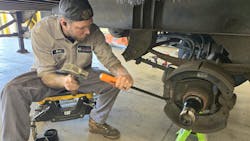Key Highlights
- With Brake Safety Week approaching, technicians need to make sure they're inspecting their truck brakes properly
- Inspections shouldn't only look at the brakes at the wheel
- Technicians should also be checking the air lines, tires, air pressure sensors
The Commercial Vehicle Safety Alliance (CVSA) will be hosting their annual Brake Safety Week at the end of the month, scheduled for August 24-30.
To help emphasize and promote brake safety, law enforcement in the United States, Mexico, and Canada will be hosting educational sessions, conducting inspections, and collecting data on brake-related violations. Each year, CVSA chooses a specific area of focus—for 2025, it’s drums and rotors. Getting your fleet ready is essential, as trucks with out-of-service violations will be removed from the road until repaired—brake-related or not.
I have a few tips that cover some areas not mentioned by CVSA that may still come up during an inspection to make sure your fleet is as ready as possible for Brake Safety Week.
Kinked air lines
Not sure where to start? CVSA provides a number of helpful resources on their website, including a detailed checklist of what inspectors will be looking for during Brake Safety Week.
However, there are a few items that I noticed weren't mentioned. Kinks in air lines, for instance, can result in a violation if discovered by an inspector. Particularly prone to kinking are the plastic coiled air lines that connect the tractor and trailer, so remember to take a good look at these. According to the CVSA checklist, you should also remedy “chafing or rubbing air lines against other air lines and/or other components” and “air lines that are worn to the extent that the diameter of the hose has been reduced.” Dry rotted lines are also grounds for a violation.
Avoid an out-of-service violation and replace any kinked or otherwise damaged air lines and hoses.
Testing with brakes applied & unapplied
Naturally, CVSA also instructs inspecting brake systems for air leaks. However, they don’t specify if this test is performed when the brakes are on or off, which could make a difference in whether or not a leak is detected.
My recommendation? Test it both ways. In doing so, you’ll know that your trucks are compliant regardless of how the test is performed during an inspection.
Remember your tires
It might be Brake Safety Week, but that doesn’t mean you should neglect your tires. After all, these parts are just as integral to your braking systems as pads, rotors, calipers and drums. An issue with your tires will also result in an out-of-service violation, so remember to carefully inspect these and fix any issues you find.
I recommend covering the standard checklist for tires to be on the safe side, such as underinflation, damage, low tread depth, exceeding the load limit, and so on. Here's a full list of federal regulations for tires.
Low air pressure warning devices
Finally, I want to call attention to low air pressure warning devices. These can pose a serious danger if not properly maintained and yet are often overlooked. If this system can’t detect low air pressure in your braking, suspension, and other air-operated components, you may receive a violation.
Along with examining the health and condition of the corresponding valves, gauges, and governors, check to confirm that the indicator light is illuminating properly.
Brake Safety Week kicks off on August 24, 2025, so there’s still time to get your fleet ready.
About the Author

Joe Puff
Vice President of Truck Technology & Maintenance
Joe Puff, vice president of Truck Technology & Maintenance at NationaLease, is a passionate and hands-on transportation executive with over 40 years of comprehensive experience in the industry. Since 2014, he has played a key role in the NationaLease team, leveraging his expertise to analyze fleet operations and design effective transportation solutions that reduce the total cost of vehicle ownership for clients.
Puff's background encompasses commercial vehicle specifications and procurement, preventive maintenance, asset management, process improvement, employee development, and P&L performance. His work spans a variety of competitive business settings, including multi-location full-service lease facilities, truck dealerships, and commercial tire centers. Puff has also excelled in specialty sales settings such as full-service lease and rental, dealership fleet and retail sales, municipality sales, contract maintenance, parts, and service sales.
His strategic insights, commitment to excellence, and ability to share the latest vehicle technologies and best practices across the NationaLease North American network have established Joe as a trusted advisor in the transportation industry. He consistently delivers superior results for businesses and organizations, utilizing his knowledge of root cause analysis, target account selling, negotiations, fleet cost analysis, and preventive maintenance to drive success in his work.
Puff's career includes a progressive trajectory through various roles, from apprentice to journeyman technician, service manager, district service manager, account executive, branch operations manager, and general manager of an eight-location, 175-employee business unit consisting of 1,900 vehicles. His diverse background and proven track record make him a valuable asset to the NationaLease team and its members.
